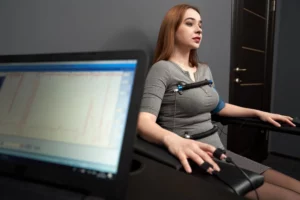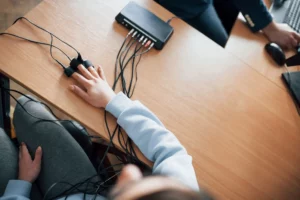So you’re considering getting a polygraph test, commonly known as a lie detector. But before signing up for one, you probably want to know – how much does it cost?
Polygraphs can range quite a bit based on several factors. In this article, we’ll give you an overview of typical costs and what goes into determining the price.
The Testing Process
First, it helps to understand what exactly goes into administering a polygraph exam. Typically, they are conducted by trained examiners using a device that measures and records certain physiological responses in your body.
The procedure involves three main phases:
Pre-Test Phase
- Initial consultation with the examiner
- Review of what to expect during the exam
- Medical and mental health screening
- Signing consent and release forms
In-Test Phase
- Baseline physiological readings are taken
- You are asked a series of yes/no questions
- Readings are taken and compared to your baseline
Post-Test Phase
- Examiner analyzes the test data
- Examiner reviews results and conclusions with you
- Any additional requested testing
The actual test itself usually takes 1-2 hours. But with the pre-test and post-test phases, the entire process can take 3-5 hours or longer.
Key Factors That Influence Costs

Main factors that affect the costs include:
1. Examiner qualifications and experience
Operator credentials and skill level have a significant impact on costs. Examiners must complete advanced training in polygraph instrumentation, interrogation techniques, and analytical methods.
More experienced examiners or those with advanced credentials (e.g. former law enforcement) typically charge higher rates. Their expertise commands a premium price.
2. Type of polygraph test
Different types take different amounts of time and have varying complexity. Common tests include:
- Screening – Used for pre-employment screening or general background checks. Typically 60-90 minutes.
- Specific issue – Focuses on a single incident, such as a crime. Usually 90-120 minutes.
- Multiple issue – Covers multiple incidents or topic areas. Can take over 2 hours.
The more complex and lengthy, the higher the cost is likely to be.
3. Location of testing
Like most services, costs are significantly influenced by where you get them done. Examiner rates can vary greatly by region and by rural versus urban areas.
Major metro areas like New York City or Los Angeles will be more expensive than a small town. Expect to pay the highest costs in large coastal cities.
4. Additional services
Beyond the polygraph test itself, examiners may charge extra fees for:
- Extended consultations
- Psychological assessments
- Forensic analysis of test data
- Court testimony
- Travel fees if they must come to your location
Any add-ons like these will increase your total costs.
5. Private versus government testing
Polygraph tests ordered by court/government agencies typically cost less than those from private examiners.
Many private examiners are retired law enforcement who can charge higher market rates. Government programs have standardized testing procedures and fees.
Next, let’s look at standard price ranges based on these factors.
Typical Price Ranges

Given all the factors that influence costs, what can you expect to pay for a polygraph? Here are some typical price ranges:
Basic Screening Exam
For a basic 1-2 hour pre-employment or general screening polygraph exam, costs often range from $300 to $500.
Specific-Issue Exam
For a more involved 90-120 minute exam on a single incident or topic, expect prices from $400 to $700.
Full-Scope Exam
A lengthy 2+ hour multi-topic polygraph test often costs between $500 and $1,000.
Government/Court-Ordered Testing
Polygraph tests ordered by government agencies or legal proceedings generally range from $300 to $600.
Major Metro Area Exams
In major cities like Los Angeles, New York, Chicago etc, expect to pay 15-25% more than the rates above.
Added Services
Any add-ons like extended consultations, analysis, or court testimony will add $100 to $300+ to the total.
As you can see, you’re looking at a wide range based on the specifics – anywhere from a few hundred dollars to over $1000 for more complex exams with extras.
Now let’s go over some money-saving tips.
Ways to Reduce Your Polygraph Testing Costs
If the prices above are outside your budget, here are some common ways to reduce them:
- Opt for a shorter, more basic exam – The type of polygraph test is the largest cost factor. A quick screening test will be far cheaper than a full-scope one.
- Use a trainee or newly certified examiner – Those still gaining experience will charge much less. Just know their testing skills won’t be as strong.
- Take the exam during slow times – Avoid peak days/hours when examiners charge more. Weekdays and non-rush hours are best.
- Travel outside your area – If you have the ability, traveling to a lower-cost rural area can yield big savings.
- Ask about package pricing – Some examiners offer discounted packages for add-ons like travel and analysis.
- Avoid extras you may not need – Additional services add up quickly, so decline ones you don’t really require.
- Compare costs from multiple providers – Shop around rather than going with the first provider you find.
- Inquire about financial assistance programs – Some examiners offer sliding scale rates or payment plans if needed.
With some savvy shopping and cost-cutting moves, you may be able to get testing fees lowered significantly. It’s worth doing the research to find suitable options within your budget.
Questions to Ask About Pricing

When reaching out to polygraph examiners, here are some key questions to ask about pricing and fees:
- Do you offer different types of polygraph tests, and how much does each cost?
- What credentials do you have, and how many years of experience?
- Do you charge hourly or flat rates? Is there a minimum number of hours required?
- What is included in your base pricing, and what carries additional fees?
- Do you offer any package deals or discounts on multiple services?
- Are there additional charges for travel, court preparation, or analysis?
- When are your slowest days/times with lower rates?
- Is there flexibility on costs for financial hardship cases?
- What payment methods and terms do you accept?
Don’t hesitate to shop around and compare several examiners to find one that fits your needs and budget.
Is the Cost of a Lie Detector Worth It?
Given the substantial out-of-pocket costs, is polygraph testing worth the investment? There are good arguments on both sides:
Worth It
- Can provide factual evidence for investigations
- Results are admissible in court in many cases
- High accuracy when conducted properly
- Gives peace of mind over doubts or uncertainty
May Not Be Worth It
- Questions about polygraph reliability remain
- Legal restrictions on use in some contexts
- Inconclusive results still possible
- Stress of the exam itself may not be worth it
Whether it’s “worth it” comes down to your specific reasons for needing it and your financial ability to cover the costs.
For critical needs like employment screening or criminal investigations, the benefits likely outweigh the costs. But for more casual personal use, the value becomes harder to justify.
Key Takeaways

Polygraph tests require a significant cash investment, but prices can vary substantially based on multiple factors. To recap:
- Expect to spend $300-$500 for basic screening exams, and up to $1000 or more for comprehensive full-scope tests.
- Examiner experience, location, test complexity, and extra services impact pricing.
- Carefully compare costs between providers to find good value for your budget.
- Ask examiners detailed questions to understand what is and isn’t included in their pricing.
While not inexpensive, they can provide vital evidence. Do your homework to find affordable testing that meets your specific needs.
Happy hunting!


